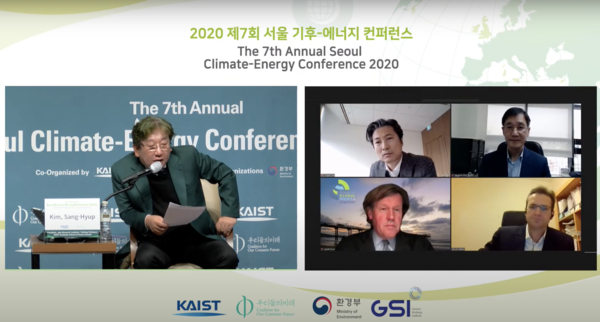On November 27, the KAIST Graduate School of Green Growth (GSGG) hosted the 7th Seoul Climate-Energy Conference (CEC) in collaboration with the Coalition for Our Common Future (COCF). The COCF is a Seoul-based non-profit organization working to promote sustainable practices against climate change, social inequity, and the division of North and South Korea. The CEC, which this year was themed “Green Finance and Business Creation in the Climate Crisis Era”, was broadcast live on KAIST’s YouTube channel, and included speakers from the Ministry of Environment, the Green Climate Fund (GCF), and the Asia Society Policy Institute (ASPI), as well as KAIST professors and students.

The CEC was organized into five plenary sessions. The first of these, on the topic of “Climate Crisis and Global Leadership”, was moderated by Professor Sang-Hyup Kim of the GSGG. The keynote speakers pointed out that, as yet, “the atmosphere doesn’t know about our conferences or actions,” and highlighted the necessity for technological development and international cooperation. Tong-Q Lee, Director General of the International Cooperation Bureau for the Korean National Council on Climate and Air Quality, was a member of the discussion panel. He expressed relief at the recent election of Joe Biden as the new US president in terms of prospects for international climate agreements and emphasized the importance of regional partnerships, such as between Korea, China, and Japan.
The second plenary session, titled “Green New Deal and Green Finance”, delved into examples of national policy from China, the UK, and Korea, which were introduced by representatives from each country respectively. The third session, covering “Sustainable Development and Green Business Creation”, was conducted in Korean with live translations provided on the broadcast. Following this, the fourth and fifth plenaries were dedicated to student presentations from KAIST GSGG. Presenters Juhyung Lee and Ji-Hye Lee, who are part of the COCF’s Climate Scouts program, gave examples of everyday sustainable changes and pointed out the significance of social media in promoting engagement in young people.
The conference MC, KAIST GSGG MS student Carine Valarché, commented that she appreciated “the general optimism of the plenaries, which showed that 2020 has been a year of progress [with] new commitments to reducing emissions and [promoting] international cooperation.” The common theme throughout the speakers’ presentations was the idea: “If not me, who? And if not now, when?” Despite everything else happening in 2020, the climate crisis continues to be one of the most pressing issues of our time.

